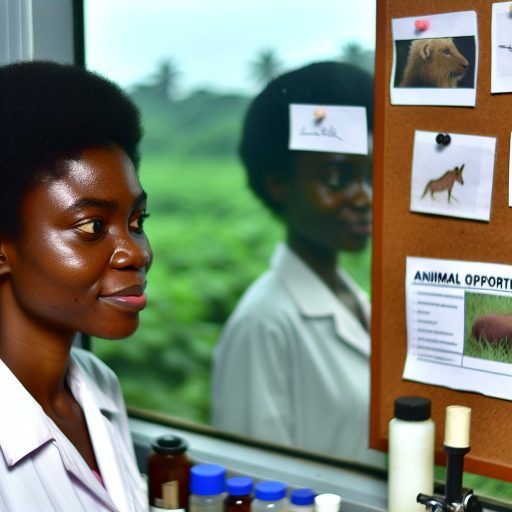Studying applied biology is crucial for understanding real-world applications of biological concepts.
However, students often face challenges such as complex theories and practical applications.
Importance of Excelling in Applied Biology Studies
Excelling in applied biology studies enables students to bridge the gap between theoretical knowledge and practical applications.
This knowledge is essential for careers in environmental science, medicine, and biotechnology.
Challenges Faced by Students
One of the main challenges students face in applied biology studies is the integration of various disciplines such as genetics, ecology, and physiology.
This requires a deep understanding of how different components interact within living organisms.
Tips for Excelling in Applied Biology Studies
- Stay organized: Keep track of deadlines, assignments, and study schedules to ensure you stay on top of your coursework.
- Develop critical thinking skills: Analyze and evaluate the information presented to you, and think critically about how different concepts relate to each other.
- Seek help when needed: Don’t hesitate to ask your professors or peers for help if you are struggling with a particular topic or concept.
- Engage in hands-on experiences: Participate in laboratory experiments, fieldwork, or internships to gain practical experience and reinforce your theoretical knowledge.
- Stay curious and motivated: Passion for biology will drive your success in applied biology studies. Stay curious, ask questions, and always seek to expand your knowledge.
By following these tips and strategies, students can excel in applied biology studies and prepare themselves for successful careers in various scientific fields.
Develop a strong foundation:
Understand basic biology concepts thoroughly to excel in applied biology studies.
Build a solid knowledge base before exploring more advanced applied biology topics.
Familiarize yourself with the fundamentals of biology such as cell structure, genetics, and ecology.
Gain proficiency in essential biological concepts like evolution, metabolism, and cellular processes.
Mastering the basics will provide you with a strong framework for understanding complex applied biology principles.
Stay updated with current research:
Follow recent advancements and discoveries in the field of biology to enhance your knowledge.
Regularly read scientific journals, articles, and publications to stay informed about cutting-edge research.
Attend seminars, webinars, and conferences to keep up with the latest developments in applied biology.
Engage with experts in the field through networking opportunities to expand your understanding.
By staying current with research trends, you can apply the most up-to-date information to your studies.
Utilize practical experience:
Participate in lab experiments, fieldwork, and practical activities to gain hands-on experience.
Apply theoretical knowledge to real-life scenarios to deepen your understanding of applied biology concepts.
Work on research projects, internships, or volunteering opportunities to bolster your practical skills.
Collaborate with peers and faculty members on practical tasks to enhance your teamwork and communication skills.
Practical experience will not only reinforce theoretical concepts but also prepare you for real-world applications.
Develop critical thinking skills:
Analyze and evaluate biological information critically to form well-rounded arguments and conclusions.
Practice problem-solving and decision-making to tackle complex biological challenges effectively.
Question existing theories, assumptions, and methodologies to develop a deeper understanding of biological concepts.
Cultivate a curious and inquisitive mindset to explore different perspectives and approaches to biology.
Critical thinking skills are essential for excelling in applied biology studies and conducting meaningful research.
Seek mentorship and guidance:
Find mentors or professors who can provide valuable insights, advice, and support throughout your academic journey.
Seek guidance from experienced professionals in the field of biology to gain valuable expertise and knowledge.
Build strong relationships with mentors who can offer career guidance, research opportunities, and academic assistance.
Foster mentorship relationships to receive feedback, encouragement, and direction in your applied biology studies.
Mentors can help you navigate challenges, explore opportunities, and reach your full potential in the field of biology.
Stay updated with current research:
Staying updated with current research is crucial for excelling in applied biology studies.
By keeping abreast of the latest developments in the field, students can gain valuable insights and stay ahead of the curve.
Here are some tips on how to stay well-informed:
- Read scientific journals: Scientific journals are a goldmine of information for biology students.
- Attend conferences: Conferences are excellent platforms for networking with fellow researchers, experts, and industry professionals.
- Follow reputable websites and blogs: Stay connected with online platforms that focus on biology news and updates.
- Join professional associations: Becoming a member of professional biology associations can provide access to exclusive resources.
- Engage in discussions with peers and mentors: Actively participate in discussions with your peers, professors, and mentors to exchange ideas.
- Follow researchers on social media: Many researchers share their work and insights on social media platforms like Twitter and ResearchGate.
- Keep an open mind and be curious: Cultivate a mindset of curiosity and openness to new ideas and perspectives.
Embrace a lifelong learning mindset and make a conscious effort to stay informed about the latest developments in the dynamic world of biology.
See Related Content: Exploring Nigeria’s Diverse Fauna in Zoology Studies
Hands-on experience is crucial in applied biology studies.
It allows students to apply theoretical knowledge in practical settings.
Enhancing their understanding of key concepts.
Transform Your Career with Expert Guidance
Get personalized mentorship consulting that’s tailored to your unique path. Our expert advice is actionable and exclusive.
Get StartedImportance of Practical Experience
- Practical experience reinforces theoretical knowledge.
- It helps students develop critical thinking and problem-solving skills.
- Hands-on activities improve retention and understanding of complex concepts.
- Students learn valuable laboratory techniques and fieldwork methods.
By engaging in hands-on experiments, students can observe biological processes firsthand.
This leads to a deeper appreciation and comprehension of the subject matter.
Suggestions for Gaining Hands-on Skills
- Seek out internships at research institutions or biological labs.
- Volunteer for fieldwork opportunities with environmental organizations.
- Participate in research projects with faculty members or graduate students.
- Join student organizations that focus on hands-on biology activities.
Internships provide real-world experience and the chance to work alongside professionals in the field.
They offer a glimpse into the daily tasks and responsibilities of biologists.
This helps students decide on their future career paths.
Fieldwork opportunities allow students to study plant and animal species in their natural habitats.
Applying ecological principles and conducting research in the field.
This hands-on experience is invaluable for those interested in environmental biology or conservation.
Research projects enable students to delve deeper into specific areas of biology.
Conducting experiments, analyzing data, and presenting their findings.
Working closely with mentors and peers enhances collaborative skills.
This fosters a sense of scientific inquiry.
Student organizations provide a platform for like-minded individuals to engage in biology-related activities.
They offer networking opportunities and a supportive community for budding biologists.
Uncover the Details: Overview of Chemical Sciences in Nigeria
Time management:
Set priorities: Identify the most important tasks to complete first.
Use a planner: Organize your schedule to allocate time for studying, lab work, and activities.
Avoid procrastination: Start tasks early to prevent cramming and last-minute stress.
Break tasks into smaller steps: Make complex tasks more manageable and less intimidating.
Take breaks: Schedule short breaks to refresh your mind and avoid burnout.
Eliminate distractions: Find a quiet study space and turn off notifications to stay focused.
Delegate tasks: Don’t be afraid to ask for help or share responsibilities with classmates.
Review and adjust: Regularly reassess your schedule and make necessary changes to stay on track.
Practice time blocking: Allocate specific time slots for different activities to maximize productivity.
Reward yourself: Celebrate achievements to stay motivated and maintain a healthy work-life balance.
Strategies for creating a study schedule and sticking to deadlines:
Set specific goals: Define what you want to achieve in each study session.
Estimate study time: Calculate how long each task will take to allocate time effectively.
Include buffer time: Account for unexpected delays or additional study needs in your schedule.
Use a visual calendar: Track deadlines and study sessions on a calendar to stay organized.
Prioritize tasks: Focus on high-priority assignments and exams to avoid last-minute rushing.
Stay consistent: Follow your schedule regularly to build a routine and improve time management skills.
Break down tasks: Divide larger projects into smaller tasks with specific deadlines for better progress tracking.
Reduce multitasking: Concentrate on one task at a time to improve focus and productivity.
Seek accountability: Share your study schedule with a friend or classmate to stay committed to your goals.
Reflect on progress: Review your study habits and schedule effectiveness to make necessary adjustments.
Gain More Insights: Benefits of Studying Animal Science in Nigeria
Seek mentorship:
It is highly recommended for students to seek out a mentor in the field of applied biology.
A mentor can provide valuable guidance and support to help students excel in their academic and career goals.
Benefits of having a mentor:
- Personalized guidance:
- Networking opportunities:
- Professional development:
- Emotional support:
- Career guidance:
A mentor can offer personalized advice tailored to the student’s specific needs and goals.
This guidance can help students navigate the complexities of their studies and career path with more clarity and confidence.
Mentors often have extensive networks in the field of applied biology.
They can introduce students to professionals, potential employers, and other valuable contacts to help advance their career.
Mentors can provide insights into the latest trends and developments in the field.
They can suggest resources, workshops, and opportunities for skills development to enhance the student’s expertise.
Pursuing studies in applied biology can be challenging and stressful at times.
A mentor can offer emotional support, encouragement, and motivation to help students stay focused and resilient.
A mentor can offer valuable advice on career options, job search strategies, and professional development.
They can share their own experiences and insights to help students make informed decisions about their future.
Tips for finding a mentor:
- Research potential mentors:
- Build a relationship:
- Communicate effectively:
- Be proactive:
- Show gratitude:
Identify professionals in the field of applied biology whose work and expertise align with your interests.
Reach out to them through email, LinkedIn, or networking events to express your interest in mentorship.
Invest time and effort in building a relationship with your mentor.
Show genuine interest in their work, seek their advice, and actively engage in discussions to build trust and rapport.
Clearly communicate your academic and career goals to your mentor.
Be open to feedback, ask questions, and follow through on the advice and guidance provided.
Take initiative in setting up regular meetings or check-ins with your mentor.
Keep them updated on your progress, challenges, and achievements, and seek their input on important decisions.
Acknowledge and appreciate the time, expertise, and support your mentor provides.
Express your gratitude through thank-you notes, small gestures, or by paying it forward through mentoring others in the future.
Mentorship can be a valuable tool for students pursuing studies in applied biology.
By seeking out a mentor, students can gain personalized guidance, networking opportunities, professional development, emotional support, and career guidance to help them excel in their academic and professional endeavors.
It is important for students to actively seek out mentorship, build strong relationships with their mentors, communicate effectively, take initiative, and show gratitude for the support they receive.
A mentor can play a crucial role in shaping the success and growth of students in the field of applied biology.
You Might Also Like: Top Nigerian Universities Offering Zoology Programs

Collaborate with Peers:
Collaborating with your peers is an essential aspect of excelling in applied biology studies.
Working together with classmates on various projects or forming study groups can greatly benefit your learning experience and overall academic performance.
Advantages of Collaborating with Classmates:
- Improved understanding: When you collaborate with your peers, you have the opportunity to discuss challenging concepts and clarify any doubts you may have. This can lead to a deeper understanding of the material.
- Diverse perspectives: Every individual brings a unique perspective to the table. By working with classmates, you can gain insights that you may not have considered on your own, enriching your learning experience.
- Division of workload: Group projects or study groups allow you to divide the workload among group members. This can help alleviate the burden of completing tasks on your own and ensure a more efficient completion of assignments.
- Enhanced problem-solving skills: Collaborating with peers can improve your problem-solving skills as you work together to overcome obstacles and find solutions to complex problems. This can help you develop critical thinking abilities.
Benefits of Sharing Knowledge and Learning from Each Other:
- Expanded learning: Sharing knowledge with classmates can expose you to new ideas and concepts that you may not have encountered before. This broadens your understanding of the subject matter and enhances your learning.
- Strengthened communication skills: Working with peers requires effective communication to convey ideas, discuss topics, and coordinate tasks. This can help you hone your communication skills, which are valuable in academic and professional settings.
- Peer support and motivation: Collaborating with classmates creates a supportive environment where you can motivate each other to stay focused and committed to your studies. This peer support can help you overcome challenges and stay on track with your academic goals.
- Building a professional network: Establishing connections with your peers through collaboration can lead to valuable networking opportunities in the future. These relationships can be beneficial for academic endeavors, career development, and personal growth.
Collaborating with your peers in applied biology studies not only enhances your academic performance but also fosters a sense of community and teamwork.
By working together, sharing knowledge, and learning from each other, you can maximize your learning potential and excel in your studies.
So, don’t hesitate to reach out to your classmates and explore the benefits of collaboration in your academic journey.
Stay motivated:
Staying motivated is crucial for excelling in applied biology studies.
Here are some tips to help you overcome challenges and stay focused on your academic goals:
Provide motivational tips for overcoming challenges:
- Believe in yourself and your abilities.
- Take small steps to tackle big projects.
- Seek support from friends, family, or mentor.
- Stay organized and create a study schedule.
- Reward yourself for accomplishing milestones.
Encourage students to set realistic goals:
- Set specific, measurable, achievable, relevant, and time-bound (SMART) goals.
- Break down larger goals into smaller tasks.
- Track your progress and adjust your goals as needed.
- Celebrate small victories to stay motivated.
- Stay positive and focus on the progress you’ve made.
By following these tips, you can maintain your motivation, overcome challenges, and achieve success in your applied biology studies.
Remember, it’s important to stay focused on your goals and celebrate your achievements along the way.
Mastering applied biology requires dedication and practice.
By staying organized, participating actively in class, and seeking help when needed, students can excel in their studies.
It is essential to understand the practical applications of the concepts learned in class, as well as the importance of critical thinking in problem-solving.
Furthermore, regular review and self-assessment can help students identify their strengths and weaknesses, allowing them to focus on areas that need improvement.
Utilizing resources such as textbooks, online materials, and study groups can enhance understanding and retention of course material.
Success in applied biology studies is achievable with the right mindset and study habits.
Students should take advantage of opportunities to engage with the material, seek clarification when needed, and actively apply what they have learned in practical settings.
By implementing the tips provided in this blog post, students can maximize their learning potential and excel in their applied biology studies.
Additional Resources
How to Become a Nurse with a Biology Degree in Just 6 Steps
Opeyemi Nofiu – Graduate Student – Washington State University …




